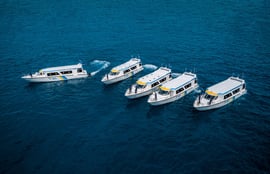There is no pathway to long-term development in Small Island, Large Ocean States like the Maldives that does not put the ocean at its centre. The Blue Economy is not an alternative - it is the imperative.
At the Cusp of Opportunity
With just 115 square miles of land scattered across 35,000 square miles of ocean, few of its sand-fringed, palm-draped islands stretch beyond 300 acres, yet threaded together, the land and sea are the fabric of Maldivian identity: a relationship of profound interconnectedness between people, land, and sea.
For years, the country has made significant strides in expanding its infrastructure and connectivity. While this growth has unlocked critical connectivity and economic opportunity, it also highlighted the need to balance progress with preservation. The country’s most precious asset - its natural capital, including coral reefs, seagrass beds, and mangrove forests - now faces growing pressures. These ecosystems, which sustain island communities and biodiversity, are increasingly vulnerable and in need of renewed care and protection.
For Large Ocean States like the Maldives, the economy is closely tied to ocean ecology, with nearly 25% of marine life residing in coral reefs. These reef systems support key industries—tourism and fisheries—contributing at least 20% to annual productivity and providing coastal protection valued at up to 8% of GDP. Yet, the Indian Ocean has lost 30% of its live coral cover in recent decades, a trend echoed in Maldivian waters. In a nation where 99% of its territory is ocean, this represents both an environmental and economic crisis.
To truly thrive, the Maldives must shift from an extractive, carbon-intensive model (with a heavy reliance on imported diesel) to a regenerative, inclusive one. In other words, going deeply blue.
Prosperity from the Sea
Change is swelling in the tides of the Maldivian economy.
95% of all registered businesses in the country are micro, small, and medium enterprises (MSMEs), and it is these local entrepreneurs - fishermen, women-led cooperatives, youth innovators - who keep the economy afloat. Yet, for too long, their potential has been constrained
by limited access to finance, scarce market opportunities, and the towering dominance of tourism.
But what if the same ocean that has defined Maldivian life for centuries could also define its future prosperity?
The Government of Maldives, UNDP, and the UK Government are working hand-in-hand to launch an initiative that puts the power of financial innovation in the hands of the private sector and plants the seeds for a more diverse, resilient economy that thrives beyond tourism.
We will do this by nurturing MSMEs in eco-friendly sectors—the vision is to turn blue dreams into bankable realities.
De-Risking, Unlocking, Scaling
We start with a powerful idea: that finance can be a force for good—not just profit. Through a pioneering blended finance model, the Maldives is unlocking new streams of capital for climate-smart, nature-positive enterprises.
It works by partnering with banks and financial institutions to share investment risks, directing funding toward MSMEs that are innovation-ready but fall outside the criteria of traditional lending. So, these doors are open for ventures like sustainable fisheries, seaweed farming, marine biotechnology, and circular aquaculture—sectors rich with potential, but where access to finance is often constrained by traditional risk assessments of novel ideas. And this isn’t untested. Globally, blended finance has already mobilized over USD 160 billion in the past
decade, with increasing focus on Small Island Developing States (SIDS) like the Maldives. It’s a model proven to work—now being tailored to the unique needs of island economies.
But the vision goes deeper than finance. Real, lasting change depends on building the scaffolding around these enterprises: stronger research capabilities, smarter policies, and more responsive institutions. By equipping MSME agencies, aligning with global environmental standards, and embedding innovation at every level, the initiative is laying the groundwork for a future where both businesses and ecosystems can thrive—together.
A Blue Renaissance
The Maldives’ openness to pursue a “Blue Economy” is promising and will demand a whole-of-government, whole-of-society approach. Success will require systemic transformation – optimizing legislation, incentivising financing, nurturing a new generation of entrepreneurs and a redefining of success to incorporate sustainability into the conventional risk-return equation of finance.
Maldives has a rare opportunity – not just to mitigate the ecological consequences of past growth models, but to lead both a SIDS, and a regional movement that embraces pathways aligned with nature that capitalise on the value of their natural assets. A movement where economic success is measured not just in numbers, but in reefs restored, emissions reduced, and communities empowered.




